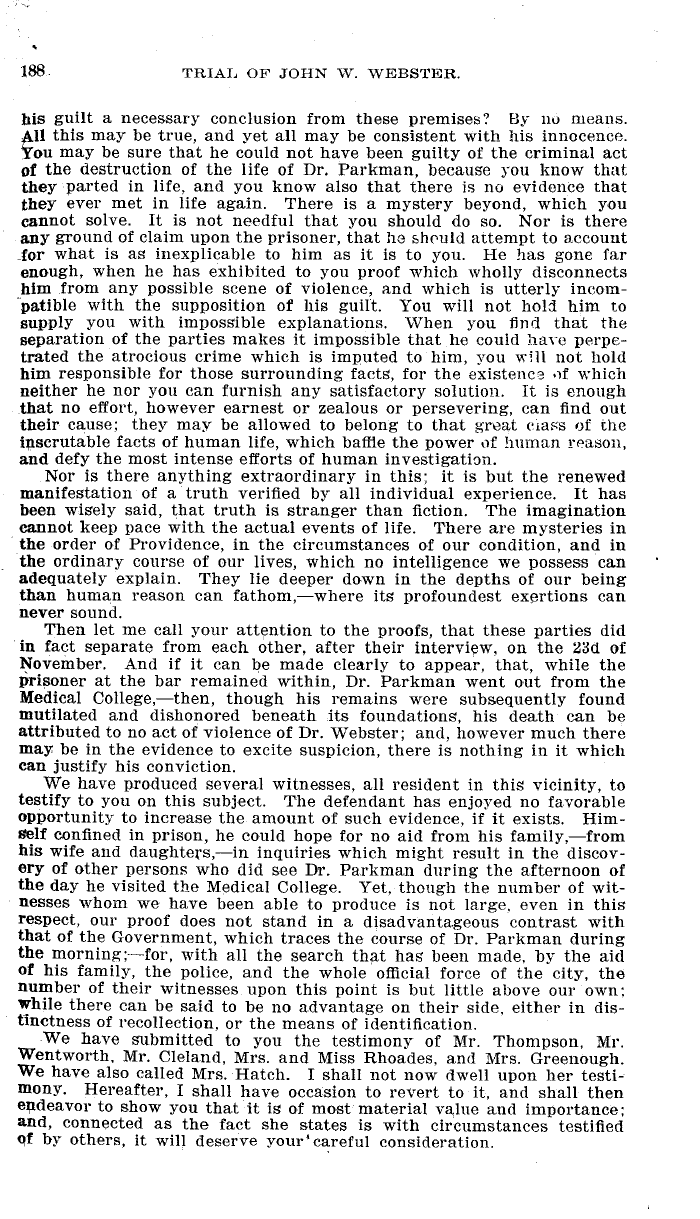|
ISS. TRIAL OF JOHN W. WEBSTER.
his guilt a necessary conclusion from these premises' By no means.
ll. this may be true, and yet all may be consistent with his innocence.
ou may be sure that he could not have been guilty of the criminal act
of the destruction of the life of Dr. Parkman, because you know that
they parted in life, and you know also that there is no evidence that
they ever met in life again. There is a mystery beyond, which you
cannot solve. It is not needful that you should do so. Nor is there
any ground of claim upon the prisoner, that he should attempt to account
for what is as inexplicable to him as it is to you. He has gone far
enough, when he has exhibited to you proof which wholly disconnects
him from any possible scene of violence, and which is utterly- incom-
patible with the supposition of his guilt. You will not hold him to
supply you with impossible explanations. When you find that the
separation of the parties makes it impossible that he could ? eve perpe-
trated the atrocious crime which is imputed to him, you will not hold
him responsible for those surrounding facts, for the existence of which
neither he nor you can furnish any satisfactory solution. It is enough
that no effort, however earnest or zealous or persevering, can find out
their cause; they may be allowed to belong to that great class ref the
inscrutable facts of human life, which baffle the power of human reason,
and defy the most intense efforts of human investigation.
Nor is there anything extraordinary in this; it is but the renewed
manifestation of a truth verified by all individual experience. It has
been wisely said, that truth is stranger than fiction. The imagination
cannot keep pace with the actual events of life. There are mysteries in
the order of Providence, in the circumstances of our condition, and in
the ordinary course of our lives, which no intelligence we possess can
adequately explain. They lie deeper down in the depths of our being
than human reason can fathom,-where its profoundest exertions can
never sound.
Then let me call your attention to the proofs, that these parties did
in fact separate from each other, after their interview, on the Z3d of
November. And if it can be made clearly to appear, that, while the
prisoner at the bar remained within, Dr. Parkman went out from the
Medical College,-then, though his remains were subsequently found
mutilated and dishonored beneath its foundations, his death can be
attributed to no act of violence of Dr. Webster; and, however much there
may be in the evidence to excite suspicion, there is nothing in it which
can justify his conviction.
We have produced several witnesses, all resident in this vicinity, to
testify to you on this subject. The defendant has enjoyed no favorable
opportunity to increase the amount of such evidence, if it exists. Him-
self confined in prison, he could hope for no aid from his family,-from
his wife and daughters,-in inquiries which might result in the discov-
ery of other persons who did see Dr. Parkman during the afternoon of
the day he visited the Medical College. Yet, though the number of wit-
nesses whom we have been able to produce is not large, even in this
respect, our proof does not stand in a disadvantageous contrast with
that of the Government, which traces the course of Dr. Parkman during
the morning;-for, with all the search that has been made, by the aid
of his family, the police, and the whole official force of the city, the
number of their witnesses upon this point is but little above our own;
while there can be said to be no advantage on their side, either in dis-
tinctness of recollection, or the means of identification.
We have submitted to you the testimony of Mr. Thompson, Mr.
Wentworth, Mr. Cleland, Mrs. and Miss Rhoades, and Mrs. Greenough.
We have also called Mrs. Hatch. I shall not now dwell upon her testi-
mony. Hereafter, I shall have occasion to revert to it, and shall then
endeavor to show you that it is of most material value and importance;
and, connected as the fact she states is with circumstances testified
of by others, it will deserve your' careful consideration.
|

